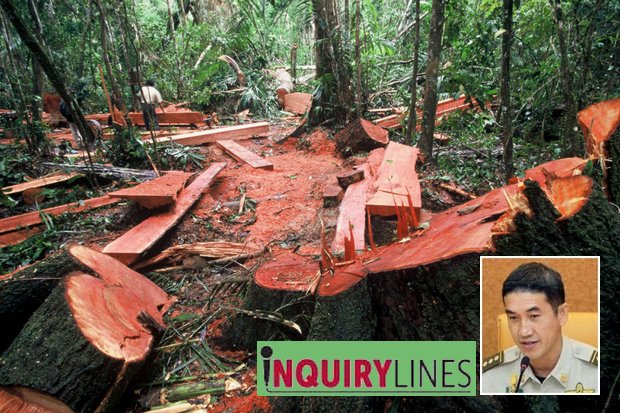
Attapol Charoenchansa, the newly-appointed chief of the Royal Forest Department (RFD), says he will be making use of his 30 years of experience to expand the country's forested area and deal with those involved with deforestation.
Mr Attapol, 52, who is also a commander of the RFD's Forest Protection Command, was appointed two weeks ago by the cabinet to take up the top job at the RFD, which has been vacant for almost a year.
The graduate of Kasetsart University's Faculty of Forestry replaced Chonlatit Surasawadi, the former chief of the RFD, who has been moved to an inactive post at the Office of the Prime Minister.

InquiryLines, published bi-weekly on Mondays is a Bangkok Post column to present in-depth details of a range of issues from politics and social interest to eye-catching everyday lives.
"I will use my experience and knowledge to take care of the country's forest. I will work to expand the country's forested and green areas to 55% of the total area, in line with the government's policies and the 20-year national strategy," Mr Attapol told the Bangkok Post.
"My job is to prevent the further encroachment of our forests, and introduce sustainable practices to indigenous people within the forests," he said.
While the RFD's top post was left unfilled for nearly one year, speculation was rife that Mr Attapol would be appointed to the position due to his extensive experience in the field.
However, shortly before his appointment, his reputation took a hit from a letter that went around the Ministry of Natural Resources and Environment, which accused him of taking bribes from the "Mulan" gang.
Mulan is the nickname of Chalida Suphanthamat, 40, the former wife of retired senior air force officer AVM Surachai Khongthet, who was arrested in August for masterminding the smuggling of rare wood to China.
The accusation prompted Mr Attapol to host a press conference to deny the accusations, which he said were groundless.
Mr Attapol said he joined the RFD's forest crime suppression unit in Phetchaburi in 1989, and has remained with the RFD ever since, until he was appointed as its chief.
He recalled 1989 as the year that the government decided to stop granting forest concessions to timber merchants over deforestation concerns.
The RFD, which was formerly under the Ministry of Agriculture and Cooperatives, then changed its policy from facilitating timber businesses to suppressing forest-related crimes.
Mr Attapol said that the job was much harder to do, given the limited amount of support given to the unit.
"When I was a junior officer, there weren't enough staff, tools and technology to support our jobs. Arrests were dependent on willing informants," he said.
"Forget aggressive actions -- we just did our routine work."
The change happened about a decade ago, when more effective tools and modern technology were introduced to streamline RFD's cooperation with other agencies, he added.
Mostly importantly, he said, the introduction of such tools has helped to raise people's awareness on the importance of protecting Thailand's natural resources.
Mr Attapol said the RFD is working with the Geo-Informatics and Space Technology Development Agency (GISTDA) to use satellite mapping to monitor forest encroachment.
"If officers found evidence of encroachments, the RFD will dispatch its special unit, 'Payak Prai', to investigate and put an end to such activities," he said.
The creation of the special unit by the RFD's former chief Theerapat Prayurasiddhi, he said, is seen by the public as a sign of the department's commitment to fight illegal logging and deforestation.
"It has become a model for other departments in the Ministry of Natural Resources and Environment to better manage their assets," he said.
Mr Attapol said the RFD is also working with other agencies to set aside some areas for the poor under the concept of "total forest land management", which was proposed by the government.
The rules in each community's are set up to reflect the government's requirements.
For example, some communities may be directed to plant economically valuable trees, such as the Siamese rosewood.
He said the concept is also aimed at reducing the unsustainable consumption of trees in the forest, while at the same time increasing the country's forest cover.
"We hope to increase Thailand's forest cover by 30%," he said.
Mr Attapol said that he will talk to the Commerce Ministry to facilitate the trade in precious timber from the allotted areas to the European Union, which requires all exported wood to have been planted by those who have never been found guilty of illegal logging.
He also said that in the future, he wants to see RFD officials to be empowered with the capacity to summon and charge those involved in a forest crime.
"Currently, such power rests with the police," he said.
Mr Attapol believes that if RFD officers were granted such powers, it will really speed up their investigations.
"My task is to create a good image of forest officials and help these officials to improve their lives," he said.
"I want all of my staff to work in a happy environment, so that they will put in their best efforts at work."